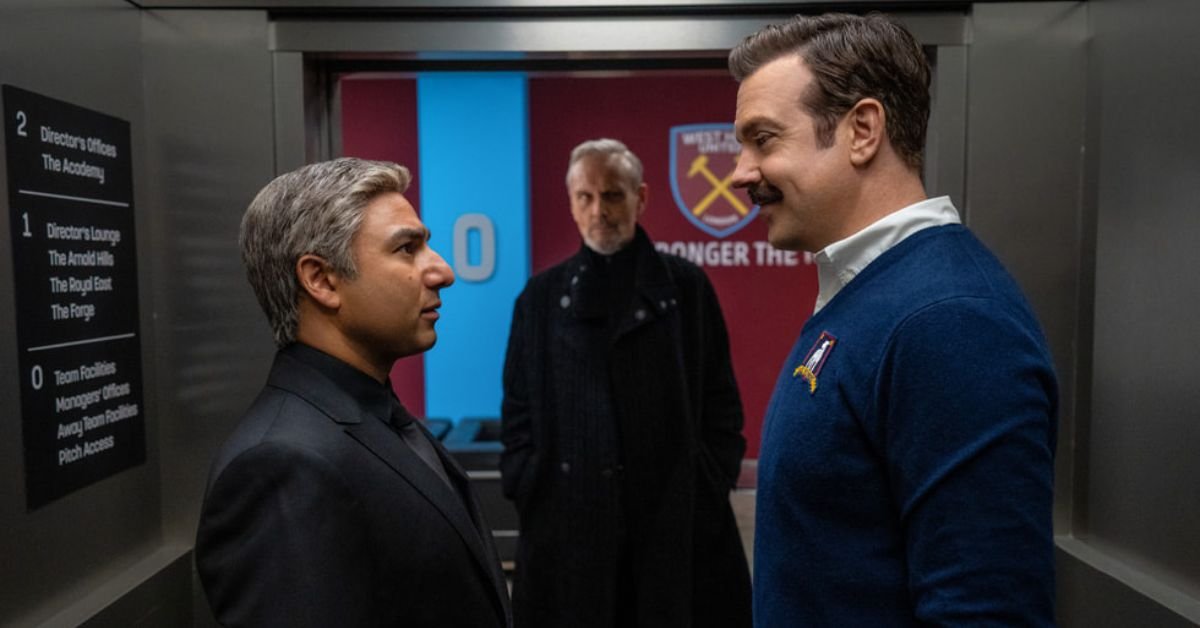Not since Judas snitched on Jesus, and Brutus snuck up on Julius Caesar has a betrayal been so keenly felt by so many. When Nate tore up Ted Lasso’s ‘Believe’ sign at the end of season two, it was as if a dagger had cut into our very own hearts. It’s been eighteen long months since then, all of us waiting and wondering how Ted was ever going to forgive Nate, and even more importantly, how were we going to be able to? This week we got our answers.
For anyone who has yet to discover Ted Lasso, the Emmy award-winning, fish-out-of-water comedy on Apple TV+ about an American football coach who arrives in London to coach soccer, the tearing up of a Believe sign will mean little, apart from the fact that you are missing one of the best TV shows of the decade. For the rest of us, the millions around the world who fell in love with the show, co-written and starring Jason Sudeikis, episode one of the new season has been highly anticipated.

There is always a holding of breath when another season of a show you love rolls out. Will the writers be able to keep delivering their magic? Will the delicate touch which has made this show so successful, becoming a feel-good mental shelter during the pandemic years, now be overdone? But as season three rolled out this week, fans were not disappointed. The magnificently comforting world of Lassoland has remained intact, the warp-speed lines and cultural reference points still litter the episodes like a trail of birdseed waiting for us to pick up on, and the writing still imparts its message of kindness, which has become its most beloved trademark.
In many ways, the set-up for the third season is as predictable as Ted’s moustache, and fans would be disappointed if it were not so. Ted must say goodbye to his son Henry at Heathrow after spending six weeks with him, making him wonder what he is doing in London. Keeley, played by Juno Temple, is now running her own PR business, but is “so busy I have to make time to sit at my desk and cry”; Rebecca, played by Hannah Waddingham, is still a ‘hot mess’ hating her ex-husband Rupert Mannion, played by Anthony Head. Nate, played by Nick Mohammed, is head coach at West Ham; and AFC Richmond, is projected to finish last this football season with West Ham predicted first.
But as always with this show, it’s the depth of the writing that turns what could be a little show into a big one. Again and again, we see how the real game-winning goal is not just the plot twists, but the core messages which can influence and inspire us in our own lives.

In the new episode, Ted takes his team into the London sewer system to inspire them to create their own internal system of working together, meaning if they can access each other’s best traits – confidence, positivity, compassion, humanity – then they will prevail as a team. It’s a message that works for the team, but also for us, the audience. No man is an island – humanity works best when we support each other.
Forgiveness is the other big message of this episode. We always knew it would be. Nate, previously promoted and nurtured by Ted, has now turned to the dark side. (There are secret nods to Star Wars throughout this show, and no coincidence that Rupert Manion’s office is set up to look like the Emperor Palpatine’s space deck). Nate is now full villain. Asked what he thinks about his former mentor and team at a press conference, he says: “They probably have to train in a sewer because their coach is so shitty.”
Will Ted bite back? In classic Ted fashion, he wishes Nate the best, refuses to say a harsh word about him and turns his own press conference into jokes about himself. By showing nothing but forgiveness and kindness to someone who set out to hurt him, our hero shows us all a better path.

Studies show that people who report higher levels of forgiveness, have better health habits and decreased anxiety levels. Remaining angry, consumed by bitterness and hatred of someone who has hurt us confines us to a state of victimhood, according to psychologists. “Forgiveness is more powerful than you might think,” explains psychologist Rubin Khoddam, Ph.D. “Staying angry, resentful, and vengeful comes at a price. All these feelings have a detrimental impact on health.”
Ted knows that. The writers of the show know that. They are showing us a better path. Generosity is wholly part of who Ted Lasso is. His core belief is that all people are worthy, even the ones who are out to trip him up. He believes that success is not about winning, but the journey in trying to be the best that we can be. It’s a formula that seems to have captured imaginations and won the show much praise among mental health professions.
Each week as a new episode of Ted Lasso season three airs, I will examine some of the life lessons behind the storylines as I review the show. You can also find more information about the psychology behind Ted Lasso in my book What Would Ted Lasso Do? How Ted’s Positive Approach Can Help You.
Season three of Ted Lasso is now streaming on Apple TV+.






